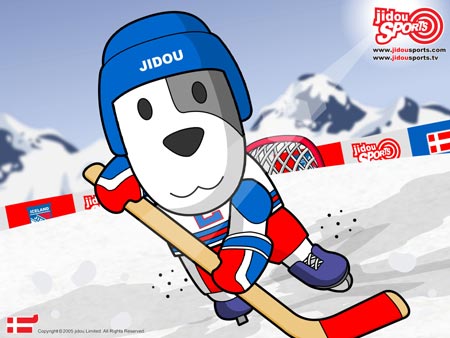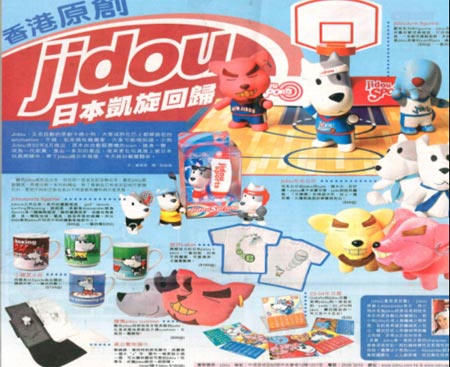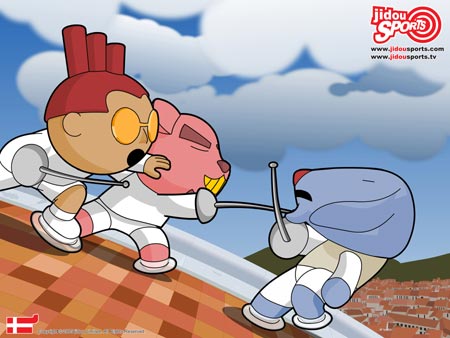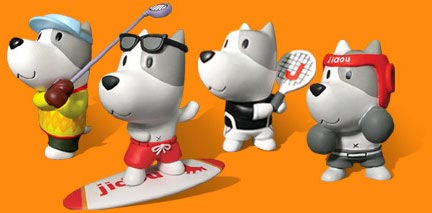
Figuratively Speaking
with Alexander Wong

JIDOUSPORTS began in 2004 as a published comic strip and a line of figurines in Hong Kong. The figurines were sold through specially designed vending machines. In Japanese, Jidou means automation, and in Chinese, self-empowerment. The four main characters are Jidou, Jazz, Judo and Dr. Jeff.
The Jidou Company and RTM are giving away 150 3-inch JIDOUSPORTS figurines - enter by February 28th.
RTM recently had a chance to speak with Alexander Wong, the creator of JIDOUSPORTS and a rising star in Hong Kong. Pull up a chair and enjoy a nice chat on Jidou, toys and a bit more.
RTM: First let's get some background on you Alex.
Alex: Oh, you mean my training? I went to school in England, and then also studied in the States. I took architecture at Princeton, and after that I worked as an architect and did a lot of buildings. And in 2001, I started working in business development as well. I'm still doing a lot of buildings and architecture, but one of the projects we did in the business development sector is the automated vending machine business. And from there we had created Jidou, which was acting as (and is still is) an interface between the machine and the human. And that's how it got started.
RTM: So how did your background and prior education help you in designed for children?
Alex: Actually, the way we see it is that we're not just designing for children, but for everyone. To us, Jidou is more than just a cartoon character - it's a brand, a concept and almost a way of life. We have created not just a two dimensional graphic or animation but we've created a world where there'll be merchandise, games and there is a whole journey through Jidou Games. It travels around the world, there are designs of gadgets, fashion, sports of course and a whole host of things.
In a way it is very much related to what my training was, because that was really not just about designing buildings per se, but also about designing lifestyles.
RTM: Why do you think many concepts have started in Asia and then crossed into the US to huge success, such as Power Rangers or Pokemon?
Alex: I think this cross-cultural phenomenon is extremely interesting. I think it shows that in a way perhaps, it's the kids that are most receptive to foreign and new cultures, In many ways, kids love adventure, excitement and going into different worlds. If you think of all these children's stories, like Arabian Nights or Journey Into The West, these stories have universal appeal. They do very well even in a foreign culture because they are so imaginative. And I think some of the properties that you've mentioned like Power Rangers, Pokemon or like Power Rangers, Pokemon or Yu-Gi-Oh, they share this commonality, which has so much imagination. Its appeal stems from the fact that kids are imaginative themselves and they become totally receptive to these stories. Of course, we have to give credit to all the marketing efforts behind these properties as well. So it's a combination of reasons.
RTM: Also part of it is due to having already been a success and proven in another market.
Alex: Yes, and I think the American market is very wise in picking up on successful brands and new brands that have already tested their appeal with kids. So they are not working on something which is entirely unknown. For investors and industry people it is understandable that they take this approach.

Ice Hockey in Iceland
RTM: A lot of the initial success for Jidou Sports came from the march of automation, with the vending machines, mobile phones and gadgets. Could something like Jidou have developed or been successful before the 'digital age' we live in?
Alex: I think that the outburst of creativity has to stem somewhat from the whole IT revolution. We do our animation at a cost which was not possible even five or ten years ago. It is not possible to do what we're doing right now if we still had to work in a big factory, using pens and working on celluloid or film, doing each drawing by hand with artists and specialists painting each and each piece of scenery, and each motion or action. I think the technologies work both ways. They not only help us to get it out there quicker, but it also helps us in the creative process, speeding it up and making it more efficient, more economical, or cost-effective. So that's the first part.
The second one is that usually an anime can't get out there until you've completed all the episodes, and that would take months, if not years. With the technology that we have right now we are actually broadcasting or making our animation available before the whole series is completed, which is unheard of. And people can watch it, something that was just completed like two weeks ago through their mobile, or sooner or later through the web in a pay-per-view sort of arrangement.
We're very excited because the mobile industry is just growing so fast. We know that in 2004 the total revenue of mobile phones in a global sense has exceeded that of land lines. This is the first time that this whole balance has been tipped. Now a lot of companies don't even have a fixed phone, everybody has a mobile phone and that mobile is the future. And of course, mobile isn't just a phone - it's also going to be your PDA, your personal entertainment machine, your music player. It's going to be a whole host of things and eventually it's going to be almost like a portable tv. So that is the future, the tv is in the portable and we're so happy that we've made this jump into the mobile industry and we are one of the first movers in Asia to have created an animation that is available through mobiles.
So you're absolutely right, we couldn't have done it before this and we couldn't have made it grow this quickly without the technology available.
RTM: How do you plan to build interest in Jidou Sports in the US with the differences in delivery between the markets?
Alex: Well we started off with the automated vending machines, and that was our beginning. Now we've moved on to another stage. We've created Jidou Games, we've created a lot of mobile content, we have publications and comics, and we have mall events and lots of merchandise as well. In a way we have moved on and Jidou Sports has a life of its own. And it isn't based on the vending machine any more - that was merely our kick start.
In the United States, we believe that the brand will be built upon all those things - mobile content, our animation, merchandise and publications and comics. These categories of products, so to speak, have universal appeal to our concepts of sports and travel. Particularly sports. We have selected sports that aren't just appealing to Asians, but sports for everyone. So we're using sports, fashion, music and travel to attract our audience in America.

RTM: What do you think are some of the contrasts between the collecting culture in Asia and the US?
Alex: You know in Asia, I think these collectibles have a slightly different meaning than to American collectors. First of all I think you need to understand that in Asia, particularly Japan, Korea or Hong Kong, people don't have a lot of living space. And therefore they have to buy something that they can keep and appreciate and that's not too big and doesn't take up all their space at home. They would invest in, say, a small figurine. It becomes an object of envy as well as an object in investment almost, because some of them do appreciate enormously.
And I think the Asian avid collector of these collectibles is a phenomenon that also is slightly related to their living environment. On top, I think Asians love to make a good bargain and buy something that even though its plastic can appreciate its value throughout time. And I think that has something to do with its appeal and function within society in this part of the world in creating value.
In the West I think that people buy it not only as an object of fun or envy to have among their friends, but also something that they can play with as well. Because there is so much space in their homes, in a way they just buy something and put it there and they probably want everything in all the different colors. So I think it's slightly different I terms of the reasons why they collect so much.
America of course, has a slightly different kind of history in the sense that all the comic book heroes that started in the 30's and 40's. These superheroes also had their own collectibles a long time before even Asians started their own figurine collections. In a way, I think Asia is copying the United States in creating all these collectibles, but in a different way and for a different audience in a different market sector.
RTM: What are some things that are unique about Jidou have helped it become so popular in Asia?
Alex: First of all, I think that Jidou Sports has a fun look and is based on sports, but it is backed up by amazing graphics and very upbeat tempo and an upbeat look. Unlike a lot of other properties for kids now, which lean towards violence or towards hatred or rebellion, or even sometimes towards sex, Jidou Sports has a wholesome look. It has this look without the trappings of wholesomeness, which is usually associated with being boring or being didactic.
Jidou Sports is cool looking and it doesn't try so hard to say 'I'm rebellious', or I'm this or that. It has its own confidence in itself and in its content and through its artwork we have shown that this confidence is consistent. That the look and the imageries are consistent with the actual content itself and the beliefs within this content.
I think that is the first point as to why people like it, and the second point is the storyline. It's not quite like the other anime that you see around at the moment. Usually it is just one thing, and you've seen it and maybe it's a little bit different. It hasn't really evolved that much. In terms of Jidou Sports we have the look of all those, the cuteness - a kind of Peanuts look to it. But actually when you watch it closely and go through the animation there are a lot of layers to it, that we actually treat it not just as animation but also as an adventure story or a film or an artwork.
We use a lot of other materials, things we've already experienced in cinema and put that in Jidou Sports so that it becomes and all-encompassing experience. It is based on the history of cinema, the history of animation and the history of music and created with a kind of richness that people will not consume in five minutes. That people will go back and watch it again to see another layer, and catch a subtext in music or a subtext in travel, a subtext in morals, a subtext in camaraderie, a subtext in plot twists. We have built it up so that it is something that will last, and hopefully a classic for years to come.

Fencing in Florence
RTM: Where do you see Jidou expanding beyond sports, or is this as universal as you can get?
Alex: I think that sports is a big step for us, and it touches so many people from so many diverse cultures, and that would always remain our main focus. However, we are also developing other areas and like the Jidou Games we're traveling around the world to interesting places introducing geography and history of other cultures to kids all around the world about kids all around the world, in fact.
At the moment we're also writing our own music, anything from New Age to African, from Rock to Folk Music, anything from Asian music to Western Music and we're exploring the possibilities of using music through our animation and introducing it to kids around the world. We're very excited because, probably second to sport, music also has one of the most universal appeals in all the arts. Much more so than film, theatre, novels or food and we're just very excited that we've also found great people to work with on our music. We write all our music, we use original music in all our animations.
RTM: What are the different ways that Jidou Sports is going to enter the US market?
Alex: I think very soon you are going to hear about the deals we're going to sign with companies that will help us to get Jidou Sports out there. I can't disclose too much at the moment for obvious reasons.
We have only ventured into the US market for a few months, so it is extremely fortunate that we're about to sign with very well-known corporations with impressive capabilities to help Jidou Sports to grow within the US market. This year we're going to go to all the fairs, starting in February with the New York Toy Fair. We will probably be doing something during the licensing show in June, and we're going to MIPCOM Junior in October. And all throughout the year there will be smaller, more regional toy shows that we'll be attending.
Our web games will be coming out and we're launching our JIDOUSPORTS.tv with web games that are all based on our animation. There will be 26 of them altogether, games with different levels. They are great fun and you can watch the animation later. Play the game then read the book - it's going to be a lot of fun.
This year is going to be a very big year for us, very busy. We are doing a lot of web promotions as well, with Raving Toy Maniac - which is exclusive in February. And also later on we might be using other publications of the industry and also with other anime related companies with our promotions.
We're just totally inundated with the demand, and this is just North America. And I can't even start to talk about all the things we have going on in Asia. We will go out into retail later, and we already have our plush at Urban Outfitters and we are going to work with another highly prestigious retail chain and hopefully we'll create special limited edition either toys or plush or collectibles for these chains that we're talking to. Hopefully you'll see them on shelves this year, around third or fourth quarter, if not even sooner.
And we have plans with mobile, because it's digital it can be out there so fast - before you know it practically. And we do believe that children will be able to watch Jidou Games, our television series, on either national or cable networks.
RTM: Have you thought of promoting this into Europe?
Alex: We have talked to some people from Europe, and they are very interested. Europe has a slightly different approach towards cartoon characters. They have a lot of their own characters, first of all. It's not quite like America in the sense that America is one country and one nation, and also one market, which is kind of unified. Europe is a series of markets, and very different markets. Western Europe is different from Eastern Europe, and even in Western Europe you have France, Italy, Germany and England. These cultures are much older than, say, the North American market. They have a different sort of baggage and different concerns and a different viewpoint in each country. And we've found that venturing into Europe at the moment would maybe be too early. I think our property will still have universal appeal, with our traveling and music and sports in particular. Eventually we will get to Europe, but because we're still in the process of creating the Jidou Games by the time we finish it the Europeans will understand what we're trying to do.
Because the European market has so many different languages - English is not the only language which works in that part of the world - with the investment costs to translate everything into different languages or to create storylines that has appeal to all the different countries is slightly trickier. We do have a lot of interest from France, for example. By October 2005 we'll be going to MIPCOM Junior in Cannes. Hopefully the European buyers and European industry people will come to recognize that Jidou Sports has a lot of potential in that part of the world.
RTM: What are some of the concepts that inspire you on a personal level?
Alex: Because I'm trained to be creative, I really re-exam everything. From a pin to a city, I think that my view of the world is that things can be so much better, so much more creative and so much more fun. When I look at sports, in a way sports could be developed, or could evolve into greater events, events that are more interesting and more exciting and with more imagination.
If you watch Jidou Games, it is actually a little bit like X-Games, that each game is not really like the way it is. For example, if we go to Florence and do fencing we are actually fencing at one of the most famous churches, cathedrals that is, which is Il Duomo, and they are actually fighting on the rooftop. But they wear these suction pads on their gym shoes so that they won't fall down.
When they are doing boxing in Thailand, they are doing Thai boxing but they do it in the sky, and when they actually land they box on the river in a floating boxing ring and the water is going to be an issue. When they go to Easter Island to do equestrian they actually encounter all the big statues, and they become their obstacles and challenges. In Iceland they are doing ice hockey and all of a sudden the ice breaks and the stadium becomes a floating piece of ice out in the sea.
It's just the way I look at the sport I will infuse it with imagination and different ways so that kids can play this game, and play the sport on the web and it would bring different levels of play, and different skills involved. Each time when we do an episode of Jidou Games it's already built into it, sort of by DNA so to speak, that it has different levels and concepts, and that the variety is already there to make it wonderfully challenging, interesting, creative and imaginative.
RTM: So you see sports as an evergreen property to work with?
Alex: Last year was the Olympics in Athens, and we got a lot of interest from a lot of people, including major mobile phone companies and also malls. We were featured in major malls with major events, with movie stars in Hong Kong - I won't mention the names because nobody would know of them in America. And also through the mobile we were used as one of the feature animations throughout the Olympics.
Because sports now is an ongoing event, we know that we only get an Olympics every four years but there are Asian Games, there are China Games, Eurogames and Commonwealth Games, and basically year-round there will be sporting events, almost every other day. I hope that Jidou Sports can work with all these events, as a mascot perhaps, or as a promoter or as a co-organizer.
We have high hopes for Jidou Sports being very active within the sports scene, as well as the music scene and fashion or travel scene. But at the moment the first step is through sport and we think we've found our niche in being a uniquely special property, that we're not just another anime, but sports anime. And in that I think a lot of potential licenses and a lot of potential companies will come to us for that specific reason. We have a vested interest in a field, which is so important nowadays, in the world, in every aspect, in education, politics, in commerce or in advertising - sports.

RTM: Are you familiar with the vinyl movement in Hong Kong?
Alex: Of course. We have created our figures, or figurines we call them, to sell through our machines, and that's how we go the publicity. In fact when the Japanese come they have to see our vending machines. It's a phenomenon, but right now the vinyl phenomenon has cooled down quite a bit. I think partly because people have bought so many that they don't have any space to put any more in their apartments, and they would hate to throw it all away.
Of course, Hong Kong is not the biggest market of anything in the world. We have limited population and a lot of fads or popular trends do tend to plateau after a period of time, and the vinyl movement has suddenly plateaued. It's still there, it hasn't disappeared, but it is not what it was before, which was just booming and making a lot of excitement within the toy industry a few years back.
RTM: What do you hope that children will take away from Jidou Sports?
Alex: There are many layers in Jidou Sports. The first level is just fun, excitement and fascination with sports and variety and different cultures of the world. Generally, have a great time. The underlying layers or subtext, so to speak, of Jidou Sports has a deeper meaning. In Jidou Sports we're actually promoting a sense of unity for the world, or rather the citizens of the world, through sports. Creating a better world, a safer world and also a peaceful world.
Throughout the story of the journey of Jidou, Jazz, Dr. Jeff and Judo they travel around the world. Through their adventures and meeting competitors along the way they have found also a bonding, and a kinship. I won't tell you the whole story, but in the end they also come closer for a variety of reasons and the ultimate message is to channel all your competitive energies into sports instead of violence, and creating a world which is safer and more peaceful.
The Jidou Company and RTM are giving away 150 3-inch JIDOUSPORTS figurines - enter by February 28th.
For more information:
JIDOUSPORTS.com
JIDOUSPORTS.tv
|









